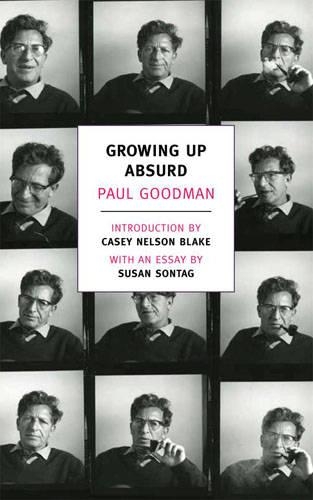
Growing Up Absurd
(Paperback, Main)
Publishing Details
Growing Up Absurd
By (Author) Paul Goodman
The New York Review of Books, Inc
NYRB Classics
15th September 2012
16th November 2012
Main
United States
Classifications
General
Fiction
305.2350973
Physical Properties
Paperback
312
Width 129mm, Height 204mm, Spine 17mm
316g
Description
Paul Goodman's Growing Up Absurd was a runaway bestseller when it was first published in 1960, and it became one of the defining texts of the nascent New Left. Goodman, at the time well into middle age, was a maverick anarchist who broke every mold, and did it brilliantly-he was a novelist, poet, and a social theorist, among a host of other things-and the book's success established him as one of America's most unusual and trenchant critics, combining vast learning, an astute mind, utopian sympathies, and a wonderfully hands-on way with words. Growing Up Absurd takes the crisis of disaffected youth as indicative of the crisis within the culture at large, which Goodman describes as being run by corporations that provide employment (when they do) but not work in any meaningful sense, work that engages body and soul. Disaffected youth was in this sense at the forefront of a disruption of a social order that was, if not directly politically repressive, humanly repressive, stifling the real human potential that, surely, a good society would serve to unleash, encourage, and pass on.
Reviews
Growing up Absurd by Paul Goodman pretty much founded the modern passion for school reform. Paul Berman
Paul Goodman, a man deeply dissatisfied with things as they are, deserves more attention than other less-conscientious objectors.His book is a highly serious effort to understand the relation between society and the disaffected youngster. John K. Galbraith, The New York Times
Goodman might be called an intuitive sociologist in his unconventional, erratic yet convincing analysis of the encouragement toward human waste that our wasteful society provides. Growing Up Absurd is his cruelly apt phrase for this fatal lack of purpose and idealism. If [John] Updikes anxiety for his fellow man is subtle, Goodmans angry polemic leaves us no doubt what makes Rabbit run. The Washington Post, 1960
His impact is all around us. Noam Chomsky
Philosopher, poet, sociologist, pacifist, psychologist, writer, anarchist, open bisexual and spokesman for a generation. Paul Goodman ranked among the most influential thinkers in the latter half of the 20th century. Ronnie Scheib, Variety
[The film] Paul Goodman Changed My Life pays tribute to a manpoet teacher social critic, guru without portfoliowhose name was once a household word and whose books were talismans of intellectual seriousness and social concern. His current obscurity is something this documentary, directed by Jonathan Lee and including eloquent testimony from friends, family and admirers, is determined to overcome.His most famous book, Growing Up Absurd, originally commissioned as a study of juvenile delinquency and later a bible of the 1960s student rebellion, remains essential and troubling reading for anyone who cares about the problems of the young. A.O. Scott, The New York Times, 10/19/11, from his review of the film "Paul Goodman Changed My Life"
Mr. Goodman is terrifying. Utopians usually are when we take them (or they take themselves) seriously. And Goodman is all the more terrifying because he is a rational Utopian who has most of analytical apparatus and theoretical formulations of modern sociology, psychology, historiography and aesthetics at his finger tips. Webster Scott, The Nation
The best analysis I have seen of the spiritual emptiness of our technological paradise. Sir Herbert Read
Paul Goodmans Growing Up Absurd is an extraordinary good and important bookthe best book I know on the subject of youth.Goodmans is a serious, profound and old-fashionedly moral book. With great originality and lucidity, he argues that the Organization Man, the beat and the juvenile delinquent are merely reactions to the same basic problem. Kenneth Keniston, The American Scholar
Author Bio
PAUL GOODMAN (1911-1972) was an American social critic, psychologist, poet, novelist, and anarchist who was a frequent contributor to such journals as Politics, Partisan Review, The New Republic, Commentary, Dissent, and The New York Review of Books. He published widely in a variety of fields-including city planning, Gestalt therapy, educational reform, literary criticism, and politics-before writing Growing Up Absurd, which in 1960 became an enormous bestseller. SUSAN SONTAG (1933-2004) was the author of four novels, The Benefactor, Death Kit, The Volcano Lover, and In America, which won the 2000 National Book Award for Fiction. Her books have been translated into thirty-two languages. CASEY NELSON BLAKE is Founding Director of the American Studies Program and Professor of History at Columbia University. He is the author or editor of several works, including The Arts of Democracy: Art, Public Culture, and the State.
